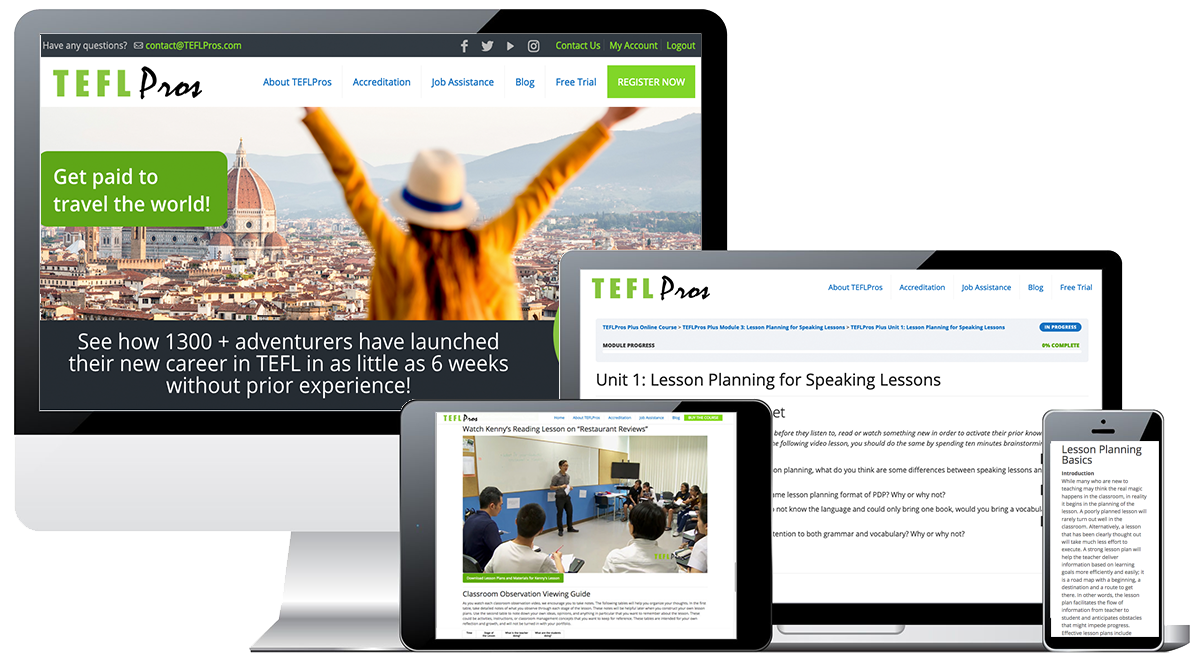
5 Things to Watch Out for When Shopping for an Online TEFL
April 2, 2018
How to Survive the Holidays: TEFL Edition
December 1, 2018
What is a TEFL Certification? Here’s What You Need To Know

What is a TEFL? If you are interested in teaching English abroad, you must understand the basics of a TEFL certification. In this article we explain what a TEFL certification is and how to choose a course that’s right for you.
What does TEFL mean?
TEFL stands for Teaching English as a Foreign Language. A TEFL certification is one of the core credentials you need in order to go abroad and teach English. Most countries around the world require their teachers to have a TEFL certificate. Therefore, it’s wise to take your time and invest in a quality option for your training.
The 2 Options: In-Person Trainings And Online Trainings

What is an in-person TEFL training?
An in-person training typically means that you sign up for a 4-week intensive course that is taught by 1 or 2 TEFL trainers in a classroom environment. Think of this option like going back to a traditional school for several weeks. Your days will typically consist of input sessions where you learn new skills, lesson planning support, and practice teaching. You will also undergo evaluations of your teaching, observe your peers teach, and provide your thoughts on their performance. This full immersion experience is a wonderful way to learn a new skill. It should involve a lot of practical training to help prepare you for life as a new teacher. These trainings are held all over the world, often in countries where TEFL is a popular career. That means you may choose to travel a long distance to attend one of these courses.
The Pros and Cons of an In-Person TEFL Training
In-person TEFL courses can provide quality instruction and skill-building. They offer a way to fully immerse yourself in the teaching experience with a group of like-minded peers. But they come with some downsides. For example, there are strict schedules for instruction and studying, no flexibility in class location, and intensive timelines which make working while studying next to impossible. There are also costly “hidden fees” like transportation, room and board, and loss of wages that many people fail to realize. Overall, in-person TEFL trainings are good if you have the time and money to dedicate to an intensive immersive experience.

What is an online TEFL training?
An online TEFL training typically means that you sign up for an individual online learning course. There is a broad spectrum of what this can mean. In general, an online training will consist of readings, exercises, videos, lesson planning support, and evaluations. These materials should be provided via an online portal. They may or may not involve a personal trainer or tutor for support. These trainings allow you to study at your own pace whenever you have free time. You can also complete this type of training while working a job or going to school. Once completed to the organization’s standards, you will be sent your certificate in the mail or online. Some online training companies will also include additional materials or support to help you on your job search.
The Pros and Cons of an Online TEFL Training
Online TEFL courses offer time flexibility, location independence, and personalized support. But the onus is on the buyer to make sure the course has high-quality instruction, full accreditation, and practical skill-building techniques shown through the use of real-life classroom and instructional videos. We suggest finding an online option that also includes the support of a trainer or tutor. This will give you peace of mind when you have a question or concern.
How to Choose a TEFL Certification
Whether you choose to go for an in-person training or an online course, there are key things to look for in a solid TEFL certification. These include asking the following questions:
- Is the TEFL course fully accredited?
- How many hours of coursework does it have?
- Is the curriculum well done?
- Are there any “red flags”?
- Will it fit my lifestyle and goals?
Is the TEFL course fully accredited?
You will want to make sure that the course you purchase is fully accredited. Look for courses that are accredited by reputable organizations. How do you know if the organization is reputable or not? Look on their website and check out the process of becoming accredited. Is it simply a case of paying a fee and then you can place their logo on your website? Or does it involve a lengthy process of evaluation? You want to take a course who has taken the time to have their curriculum properly vetted. Therefore, a quality accreditation is a must.
How many hours of coursework does it have?
The next item to look for in a TEFL course is the numbers of hours of coursework. The magic number is 120. Why? Because that has been and continues to be the industry standard for a reputable TEFL certification. Schools recognize this and pay attention to it during the interview process. So what does it mean if you see a course that claims to give you a certification in 60 hours? It means you need to keep on looking! A certification for less than 120 hours of work will not be taken seriously in the job market. Therefore, it should not be taken seriously by perspective TEFL students.
Is the curriculum well done?
How do you evaluate the quality of the TEFL curriculum when you yourself are not even TEFL certified? Here are some tips to help you consider your options more carefully.
Lesson Planning Instruction:
Make sure the course you purchase includes a large amount of lesson planning instruction. This doesn’t mean a list of sample lesson plans. This means real advice and systems for how to create your own lesson plans from scratch. Let’s put this into perspective. Consider the fact that many teachers end up teaching English in rural communities where resources are limited. In these conditions, sample lesson plans won’t be helpful. Why? Because they typically involve worksheets, textbooks, and other materials. You need to be able to create lessons independent of how much or how little you have in your teacher supply closet. This means your TEFL course needs to give you a solid understanding of all the skills you will need to teach (i.e. reading, listening, speaking, and writing) and how to plan for each type accordingly.
Lesson Planning Support:
Once you know what to do with your lesson plans, you need to practice! Make sure that the trainers on your course are going to evaluate your lesson plans and give you adequate feedback. Lesson planning is not an easy skill to master, but it is an essential skill to becoming a great teacher.
Observations of Real Classes:
This certainly needs to be a part of your TEFL training experience. Observing real teachers on the job is invaluable. It will help you integrate your lesson plans with what happens in a real classroom. Our tip is to look for TEFL courses that are heavy in observations.
Core Teaching Skills and Techniques:
Any TEFL course worth its salt will set aside time in the training for discussions on giving good instructions, correct ways to discipline, and how to get students to interact with each other. These may be listed on a syllabus as “Classroom Management Skills”. Make sure your course includes this as it is a very necessary part of the job.
Evaluations:
Evaluations can be in the form of quizzes, exams, graded lesson plans, essays, or classroom observations. A good teacher understands the importance of self-reflection and self-growth. Your TEFL course should plant the seeds to make this a habit. The presence of proper evaluations shows that the TEFL provider has high expectations for its students and won’t give a passing grade to just anyone. This shows the integrity of the institution and should give you some peace of mind in choosing to work with them.
Are there any “red flags”?
When you are shopping for a TEFL course you need to be on the lookout for red flags. As we have mentioned previously, not all courses are accredited to the same standard, and not all courses contain the same hours of coursework. We have a whole article dedicated to this topic called, 5 Things to Watch Out for When Shopping for an Online TEFL Course. We suggest reading this to learn the full scope of how to identify red flags in a TEFL course.
Will It Fit My Lifestyle?
The last item on our list is all about asking yourself whether or not the TEFL course you are considering will fit with your lifestyle and goals. Here are some questions to consider:
- How do I learn best? Does this course cater to my learning style?
- How will I use my certification? Does this course move me towards that goal?
- Do I need help finding a job? Does this course offer job support?
- What country do I want to teach in? What certification do they require?
- How will this training help me reach my future goals? Does this course give me the life skills I need?
Evaluating your answers to these questions will be an important step in determining which course provider you want to work with. There are certainly plenty of good options out on the market these days, but not all of them will be right for you.
Where Can a TEFL Certification Take You?

The opportunities a TEFL certification affords you are endless! Whether you want to go volunteer in a local village for the Peace Corps or work for a fancy international school abroad, a good TEFL certification can prepare you for the real world of teaching English as a foreign language!
Happy teaching!


